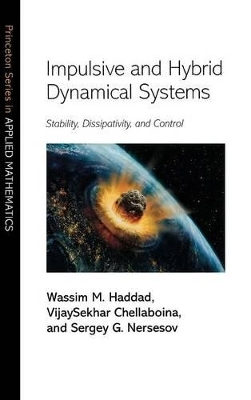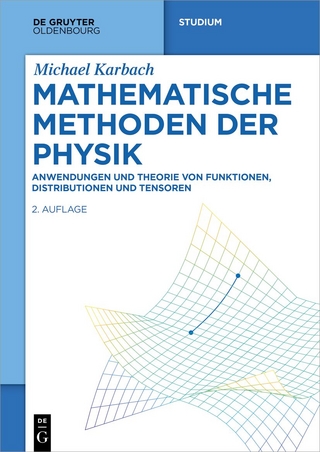
Impulsive and Hybrid Dynamical Systems
Princeton University Press (Verlag)
978-0-691-12715-6 (ISBN)
This book develops a general analysis and synthesis framework for impulsive and hybrid dynamical systems. Such a framework is imperative for modern complex engineering systems that involve interacting continuous-time and discrete-time dynamics with multiple modes of operation that place stringent demands on controller design and require implementation of increasing complexity--whether advanced high-performance tactical fighter aircraft and space vehicles, variable-cycle gas turbine engines, or air and ground transportation systems. Impulsive and Hybrid Dynamical Systems goes beyond similar treatments by developing invariant set stability theorems, partial stability, Lagrange stability, boundedness, ultimate boundedness, dissipativity theory, vector dissipativity theory, energy-based hybrid control, optimal control, disturbance rejection control, and robust control for nonlinear impulsive and hybrid dynamical systems. A major contribution to mathematical system theory and control system theory, this book is written from a system-theoretic point of view with the highest standards of exposition and rigor.
It is intended for graduate students, researchers, and practitioners of engineering and applied mathematics as well as computer scientists, physicists, and other scientists who seek a fundamental understanding of the rich dynamical behavior of impulsive and hybrid dynamical systems.
Wassim M. Haddad is Professor of Aerospace Engineering at the Georgia Institute of Technology. VijaySekhar Chellaboina is Associate Professor of Mechanical, Aerospace, and Biomedical Engineering at the University of Tennessee. Sergey G. Nersesov is Assistant Professor of Mechanical Engineering at Villanova University. Haddad, Chellaboina, and Nersesov previously coauthored "Thermodynamics: A Dynamical Systems Approach" (Princeton).
Preface xiii Chapter 1. Introduction 1 1.1 Impulsive and Hybrid Dynamical Systems 1 1.2 A Brief Outline of the Monograph 4 Chapter 2. Stability Theory for Nonlinear Impulsive Dynamical Systems 9 2.1 Introduction 9 2.2 Nonlinear Impulsive Dynamical Systems 11 2.3 Stability Theory of Impulsive Dynamical Systems 20 2.4 An Invariance Principle for State-Dependent Impulsive Dynamical Systems 27 2.5 Necessary and Sufficient Conditions for Quasi-Continuous Dependence 32 2.6 Invariant Set Theorems for State-Dependent Impulsive Dynamical Systems 38 2.7 Partial Stability of State-Dependent Impulsive Dynamical Systems 44 2.8 Stability of Time-Dependent Impulsive Dynamical Systems 56 2.9 Lagrange Stability, Boundedness, and Ultimate Boundedness 63 2.10 Stability Theory via Vector Lyapunov Functions 71 Chapter 3. Dissipativity Theory for Nonlinear Impulsive Dynamical Systems 81 3.1 Introduction 81 3.2 Dissipative Impulsive Dynamical Systems: Input-Output and State Properties 84 3.3 Extended Kalman-Yakubovich-Popov Conditions for Impulsive Dynamical Systems 103 3.4 Specialization to Linear Impulsive Dynamical Systems 119 Chapter 4. Impulsive Nonnegative and Compartmental Dynamical Systems 125 4.1 Introduction 125 4.2 Stability Theory for Nonlinear Impulsive Nonnegative Dynamical Systems 126 4.3 Impulsive Compartmental Dynamical Systems 131 4.4 Dissipativity Theory for Impulsive Nonnegative Dynamical Systems 135 4.5 Specialization to Linear Impulsive Dynamical Systems 143 Chapter 5. Vector Dissipativity Theory for Large-Scale Impulsive Dynamical Systems 147 5.1 Introduction 147 5.2 Vector Dissipativity Theory for Large-Scale Impulsive Dynamical Systems 150 5.3 Extended Kalman-Yakubovich-Popov Conditions for Large-Scale Impulsive Dynamical Systems 175 5.4 Specialization to Large-Scale Linear Impulsive Dynamical Systems 186 Chapter 6. Stability and Feedback Interconnections of Dissipative Impulsive Dynamical Systems 191 6.1 Introduction 191 6.2 Stability of Feedback Interconnections of Dissipative Impulsive Dynamical Systems 191 6.3 Hybrid Controllers for Combustion Systems 199 6.4 Feedback Interconnections of Nonlinear Impulsive Nonnegative Dynamical Systems 208 6.5 Stability of Feedback Interconnections of Large-Scale Impulsive Dynamical Systems 214 Chapter 7. Energy-Based Control for Impulsive Port-Controlled Hamiltonian Systems 221 7.1 Introduction 221 7.2 Impulsive Port-Controlled Hamiltonian Systems 222 7.3 Energy-Based Hybrid Feedback Control 227 7.4 Energy-Based Hybrid Dynamic Compensation via the Energy-Casimir Method 233 7.5 Energy-Based Hybrid Control Design 242 Chapter 8. Energy and Entropy-Based Hybrid Stabilization for Nonlinear Dynamical Systems 249 8.1 Introduction 249 8.2 Hybrid Control and Impulsive Dynamical Systems 251 8.3 Hybrid Control Design for Dissipative Dynamical Systems 258 8.4 Lagrangian and Hamiltonian Dynamical Systems 265 8.5 Hybrid Control Design for Euler-Lagrange Systems 267 8.6 Thermodynamic Stabilization 271 8.7 Energy-Dissipating Hybrid Control Design 277 8.8 Energy-Dissipating Hybrid Control for Impulsive Dynamical Systems 300 8.9 Hybrid Control Design for Nonsmooth Euler-Lagrange Systems 308 8.10 Hybrid Control Design for Impact Mechanics 313 Chapter 9. Optimal Control for Impulsive Dynamical Systems 319 9.1 Introduction 319 9.2 Impulsive Optimal Control 319 9.3 Inverse Optimal Control for Nonlinear Affine Impulsive Systems 330 9.4 Nonlinear Hybrid Control with Polynomial and Multilinear Performance Functionals 333 9.5 Gain, Sector, and Disk Margins for Optimal Hybrid Regulators 337 9.6 Inverse Optimal Control for Impulsive Port-Controlled Hamiltonian Systems 345 Chapter 10. Disturbance Rejection Control for Nonlinear Impulsive Dynamical Systems 351 10.1 Introduction 351 10.2 Nonlinear Impulsive Dynamical Systems with Bounded Disturbances 352 10.3 Specialization to Dissipative Impulsive Dynamical Systems with Quadratic Supply Rates 358 10.4 Optimal Controllers for Nonlinear Impulsive Dynamical Systems with Bounded Disturbances 366 10.5 Optimal and Inverse Optimal Nonlinear-Nonquadratic Control for Affine Systems with L2 Disturbances 375 Chapter 11. Robust Control for Nonlinear Uncertain Impulsive Dynamical Systems 385 11.1 Introduction 385 11.2 Robust Stability Analysis of Nonlinear Uncertain Impulsive Dynamical Systems 386 11.3 Optimal Robust Control for Nonlinear Uncertain Impulsive Dynamical Systems 395 11.4 Inverse Optimal Robust Control for Nonlinear Affine Uncertain Impulsive Dynamical Systems 402 11.5 Robust Nonlinear Hybrid Control with Polynomial Performance Functionals 406 Chapter 12. Hybrid Dynamical Systems 411 12.1 Introduction 411 12.2 Left-Continuous Dynamical Systems 412 12.3 Specialization to Hybrid and Impulsive Dynamical Systems 418 12.4 Stability Analysis of Left-Continuous Dynamical Systems 422 12.5 Dissipative Left-Continuous Dynamical Systems: Input-Output and State Properties 427 12.6 Interconnections of Dissipative Left-Continuous Dynamical Systems 435 Chapter 13. Poincare Maps and Stability of Periodic Orbits for Hybrid Dynamical Systems 443 13.1 Introduction 443 13.2 Left-Continuous Dynamical Systems with Periodic Solutions 444 13.3 Specialization to Impulsive Dynamical Systems 451 13.4 Limit Cycle Analysis of a Verge and Foliot Clock Escapement 458 13.5 Modeling 459 13.6 Impulsive Differential Equation Model 462 13.7 Characterization of Periodic Orbits 464 13.8 Limit Cycle Analysis of the Clock Escapement Mechanism 468 13.9 Numerical Simulation of an Escapement Mechanism 472 Appendix A. System Functions for the Clock Escapement Mechanism 477 Bibliography 485 Index 501
| Erscheint lt. Verlag | 23.7.2006 |
|---|---|
| Reihe/Serie | Princeton Series in Applied Mathematics |
| Zusatzinfo | 61 line illus. 1 table. |
| Verlagsort | New Jersey |
| Sprache | englisch |
| Maße | 152 x 235 mm |
| Gewicht | 1021 g |
| Themenwelt | Mathematik / Informatik ► Mathematik ► Angewandte Mathematik |
| Naturwissenschaften ► Physik / Astronomie ► Thermodynamik | |
| Technik ► Elektrotechnik / Energietechnik | |
| Schlagworte | Princeton Series in Applied Mathematics |
| ISBN-10 | 0-691-12715-8 / 0691127158 |
| ISBN-13 | 978-0-691-12715-6 / 9780691127156 |
| Zustand | Neuware |
| Haben Sie eine Frage zum Produkt? |
aus dem Bereich


